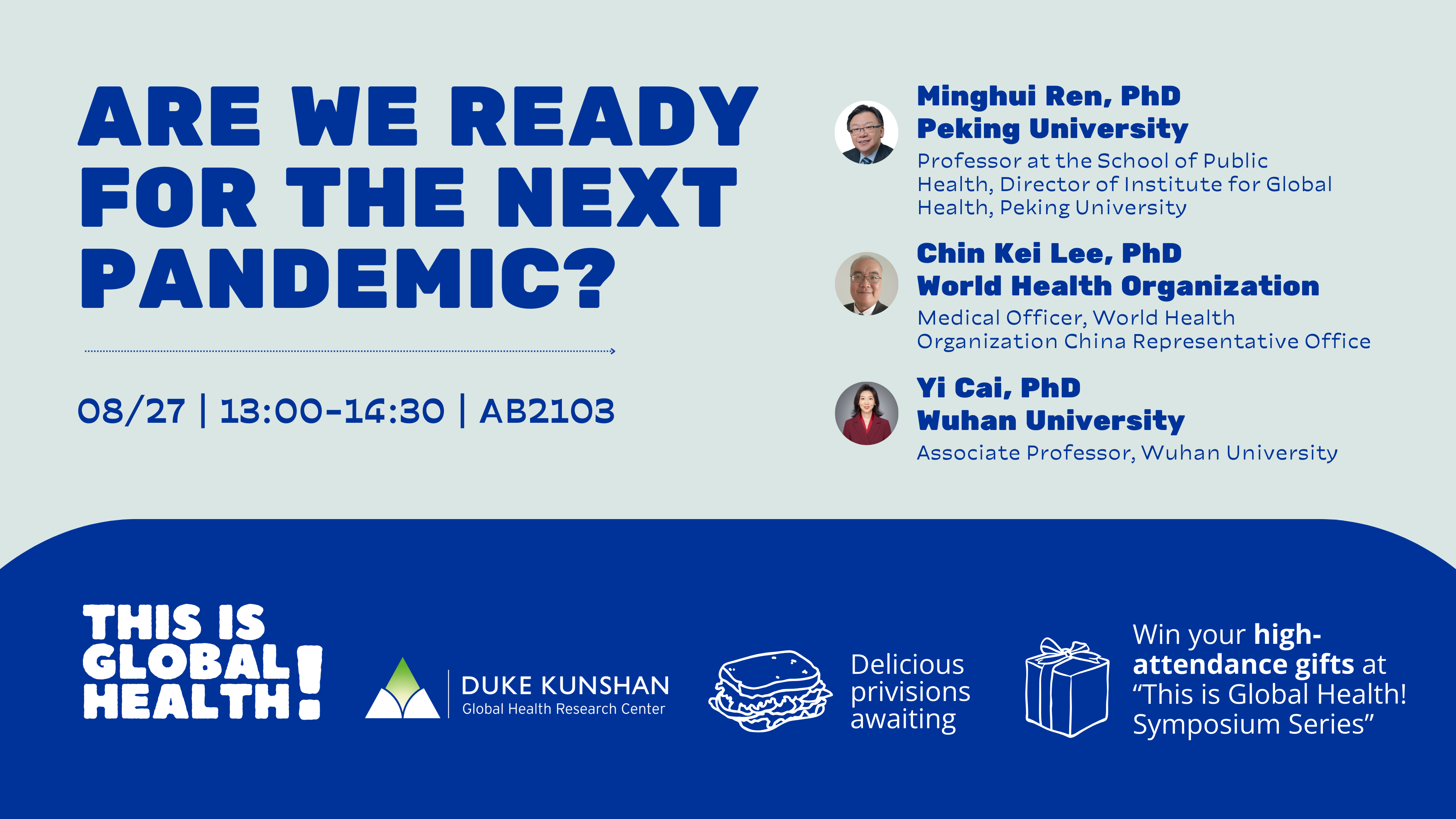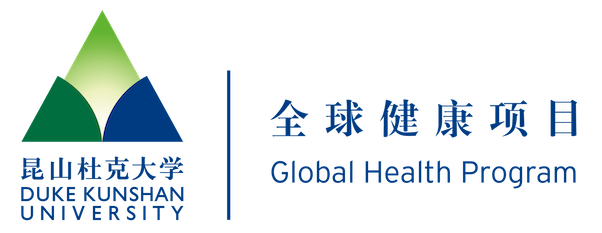On August 27, 2024, the first event of the “This is Global Health” Symposium Series in the Fall semester, organized by Duke Kunshan University (DKU) Global Health Research Center (GHRC), successfully concluded. The symposium, titled “Are We Ready for the Next Pandemic?”, brought together experts and scholars from Peking University, the World Health Organization (WHO) China Representative Office, and Wuhan University. They shared insights and reflections on global, regional, and China-specific pandemic preparedness with DKU faculty, students, and healthcare professionals from Kunshan healthcare sector.

Mr. Guohua Qian, Director of the Kunshan Center for Disease Control and Prevention, together with a total of 70 external guests from the Kunshan healthcare sector and the Chinese Consortium of Universities for Global Health (CCUGH) participated in the symposium. The event was moderated by Dr. Chenkai Wu, Assistant Professor of Global Health at Duke Kunshan University.
“We are Far from Adequate in Pandemic Preparedness”
The first speaker, Professor Minghui Ren from Peking University School of Public Health, who also serves as Director of both the Institute for Global Health and the China Center for Health Development Studies, focused on global collaboration mechanisms for pandemic preparedness. He highlighted the persistent threats posed by outbreaks such as SARS, H1N1, Ebola, and COVID-19, all of which have brought significant challenges to global socio-economic development, as well as Mpox, which was recently declared by WHO as global public health emergency again. To strengthen global readiness for future pandemics, in May 2024, the World Health Assembly passed amendments to the International Health Regulations (IHR), while negotiations for the Pandemic Agreement are still ongoing.
Prof. Ren remarked, “While we have made some progress, the countries are far from readiness to prepare for the next pandemic in terms of capacities, ownership, and community engagement required. We are not lacking in intervention, regulations or technical guidelines. The real challenge lies in how to prepare before emergencies occur, respond effectively when they happen, rebuild and recover afterward, and ultimately establish more resilient health systems.”
The Pandemic Fund, established by the World Bank in collaboration with WHO and supported byG20 countries , has provided funding to over 37 countries. On the national level, various assessment frameworks are being used to evaluate countries’ pandemic preparedness. Professor Ren shared three distinct evaluation systems used for pandemic preparedness: the self-assessment annual reporting tool under the IHR, the Joint External Evaluation (JEE), and the Global Health Security Index (GHSI) developed by the Nuclear Threat Initiative and Johns Hopkins University.
“Better score in these assessments doesn’t have much contribution to the reduction of the deaths caused by Covid-19. Additionally, we observe significant disparities between high-income and low- and middle-income countries, both in assessment results and actual responses to pandemics. More studies are needed to demonstrate the relation between the country capacity and the outcome of pandemic response,” Prof. Ren noted.
He emphasized that a paradigm shift in perspectives and health development aid, along with strong long-term commitments from countries and global partners, is the only and most urgently needed solution to ensure that countries can build the capacity, ownership, and community engagement required to prepare for the next pandemic.

“Health Security is Everyone’s Responsibility”
Dr. Chin-Kei Lee, Medical Officer for Emerging Infectious Diseases at the WHO China Representative Office, focused his keynote speech on the Asia-Pacific region’s experience in pandemic preparedness and the future direction. He introduced the Asia Pacific Health Security Action Framework (APHSAF), which was officially adopted and implemented in 2024.

Compared to the previous Asia Pacific Strategy for Emerging Diseases and Public Health Emergencies (APSED), the new framework emphasizes cross-sector collaboration, whole-of-government and whole-of-society mobilization, and comprehensive response strategies across areas such as leadership, coordination, and capacity building, rather than dividing actions by technical fields.
Dr. Lee pointed out, “Public health emergencies now have a far more profound impact on society, the economy, and individuals’ lives. Health security is everyone’s responsibility, and the entire society must be mobilized to participate. Multisectoral collaboration is also crucial, as responding to public health emergencies is not solely the responsibility of the health sector but requires coordinated efforts across all government agencies. The success of the Asia-Pacific region shows that pandemic responses must involve all aspects of society to build a more resilient system.”
He also highlighted the WHO’s ongoing Global Health Emergency Corps (GHEC) initiative, aimed at improving coordination and communication among leaders at national, regional, and global levels in responding to global public crises.
Reflections and Looking Ahead
The panel discussion, moderated by Professor Yunguo Liu, Co-Director of DKU Global Health Program, featured Professor Minghui Ren, Dr. Chin-Kei Lee, and Associate Professor Yi Cai from Wuhan University Academy of International Law and Global Governance. They shared personal experiences during the COVID-19 pandemic and offered their reflections on the current global collaboration mechanisms. They also responded to questions from students.

Drawing from her work in China and Singapore, Prof. Yi Cai noted that different countries’ responses to the pandemic varied widely, but these differences provided valuable lessons for global pandemic control. She stressed, “Every country must learn from its successes and failures, systematically reflecting on its pandemic response over the past few years to better prepare for the future.” Prof. Cai also shared insights from her team’s recent research, emphasizing China’s unique approaches to cross-sector coordination during the pandemic.
Prof. Ren reiterated the importance of strengthening health system resilience. “I firmly believe that health systems are the key to pandemic response. The COVID-19 pandemic made us realize that health systems are not just governmental structures; they also involve community leadership and participation.” He further discussed how countries in the Global South, despite limited resources, should take the initiative in developing their own health systems to tackle future pandemics. He argued that developing countries should not rely solely on external aid but should proactively request international donors invest in their health systems.
Dr. Lee agreed, adding that China not only effectively controlled the pandemic domestically but also engaged in broad health cooperation with other countries through the Belt and Road Initiative, demonstrating the importance of international collaboration. He concluded, “A pandemic is the best opportunity for us to reflect and leverage international cooperation. We need a shared voice, shared collaboration, and shared action—this is the only way to build a cooperative network and address both current and potential public health crises.”
About “This is Global Health! Monthly Symposium Series”
Since 2014, the Global Health Research Center at Duke Kunshan University has organized a series of global health symposium events, inviting leaders, scientists, and industry experts in the global health field to exchange information on the latest research progress, international and domestic development trends, and global health education and practice. By the end of the 2023-2024 academic year, the center had successfully hosted 194 seminars. Starting in Fall 2024, the series has been renamed and restructured from the “Aegon-Industrial Global Health Seminar Series” to the “This is Global Health! Monthly Symposium Series,” featuring a new format of panel talks and a vision for greater impact.
by Zhangyang Pan

